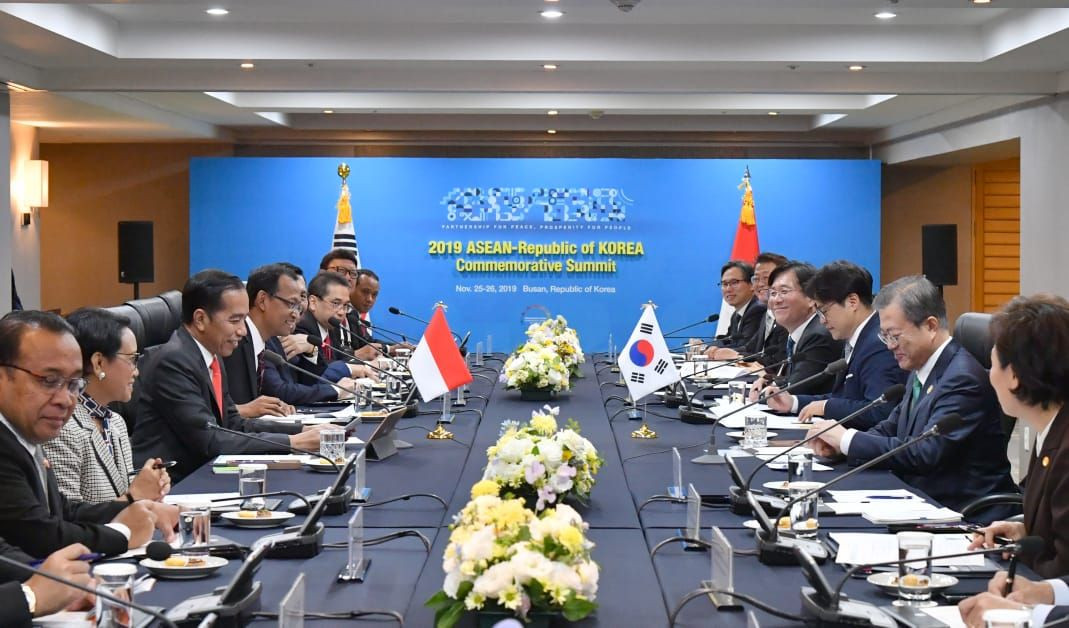Indonesia, South Korea aim for inclusive regional order, refuse to take sides
As the largest economy in Southeast Asia, Indonesia is a priority in South Korea's New Southern Policy, an initiative to increase engagement with countries in the region and India.
Change Size

I
ndonesia and South Korea share a similar stance as middle powers in the Indo-Pacific region amid the increasing rivalry between the United States and China by preferring cooperation between all parties, experts and officials have said.
In the past three years, South Korea has sought to diversify its diplomatic engagement beyond its traditional partners through its New Southern Policy, an initiative to increase engagement with countries in Southeast Asia and India.
Indonesia, the largest economy in Southeast Asia, has become one of the East Asian country’s priorities. South Korean President Moon Jae-in was on a state visit to Jakarta in November 2017 when he introduced the initiative.
Three years later, at the 21st ASEAN-Korea Summit, Moon announced that the policy would be upgraded to the New Southern Policy Plus (NSP+). The new initiative aims to strengthen and expand the existing policy and adjust its priorities to the situation caused by the COVID-19 pandemic.
While Seoul is not the first country to increase its engagement with the region, its strategy was predominantly oriented toward development cooperation rather than security, said Choe Wongi, the head of the Center for ASEAN–India Studies of the Korea National Diplomatic Academy (KNDA).
That approach, he added, set South Korea’s regional strategy apart from strategies of other countries. The US’s “free and open Indo-Pacific” (FOIP) approach, for example, was focused on containing China’s influence in the region. Meanwhile, Japan’s FOIP emphasized the need to maintain a rules-based order in the region.
“South Korea and Indonesia share not only common values, democracy and human rights, but also strategic interests in the fact that both do not want to take sides in the great power rivalry,” Choe said at a discussion organized by the Foreign Policy Community of Indonesia on Friday.
South Korea was also among countries supporting the ASEAN Outlook on Indo-Pacific, which was adopted by the bloc in 2019 amid the deepening rivalry between the US and China. The ten-country bloc highlighted the key principles of inclusivity, transparency, openness and cooperation in the outlook, while expressing reluctance to exclude China.
Choe, who was a member of the advisory group of the Presidential Committee on the New Southern Policy, said the initiative was an “economic hedging strategy” as South Korea continued to maintain good and constructive relations with China and a strategic alliance with the US.
The Indonesian Foreign Ministry’s director for East Asia and Pacific affairs, Santo Darmosumarto, said Indonesia and South Korea shared the view that cooperation in the Indo-Pacific should be aimed at ensuring that the region would not become a battleground between more influential countries.
“There's always a notion that Indonesia and [South] Korea are very different: Korea is an ally of the US […] in terms of security strategy. That is very different from Indonesia with our bebas aktif [independent and active] foreign policy,” Santo said.
“[Despite the differences], I think, together Indonesia and [South] Korea can play a particular role in promoting not only democracy but also regional order based on sharing prosperity and cooperation,” he said.
Indonesia and South Korea are both active in various regional and international groupings, including the East Asia Summit (EAS), ASEAN Regional Forum (ARF), ASEAN and South Korea, G20 and MIKTA.
Both also share a similar stance on not being very vocal on several emerging security issues in the region, such as Hong Kong and Xinjiang.
While Indonesia is known for being more vocal in expressing its concerns on the situation in the South China Sea, another flash point in the US-China rivalry, South Korea is known for pursuing a “silent diplomacy” approach over the South China Sea issue, which would not necessarily work in the country’s favor, Choe said.
“[South] Korea has a huge stake in the freedom of navigation and sea lines of communication, as most of the country’s exports and imports come in through the South China Sea. So, we have a huge stake in the security and stability of the South China Sea,” he said.









